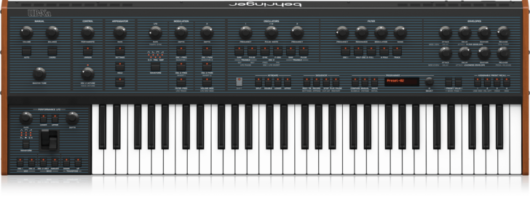Behringer UB-Xa Analog Synthesizer is ‘Ready To Be Unleased’, Priced at $1,499
The long wait is over.
Today, after awaited years, Behringer finally shared an official intro video for the UB-Xa, its flagship knockoff of the classic Oberheim OB-Xa.
The Behringer UB-Xa is a 16-voice, bi-timbral analog polysynth, featuring a 61-note keyboard with velocity and polyphonic aftertouch.
The long-awaited uber-synth may make some heads explode, because of the fact that it’s designed and marketed as an inexpensive copy of the OB-Xa, but also priced and positioned as Behringer’s first flagship synthesizer.

Behringer’s 1st. Flagship Synthesizer
The UB-Xa is priced and positioned to compete with professional analog synths from Korg, Dave Smith, Oberheim and others.
It’s a 61-note keyboard, a big, knobby front panel and 16-voices of retro-inspired analog polyphony. Other features typical of flagship synths include support for splits and layering, an arpeggiator, a step sequencer, three full-size MIDI connections and five pedal inputs.
And the audio demos show that the UB-Xa is capable of being a great-sounding synth.
The icing on the cake is polyphonic aftertouch, putting the UB-Xa into the company of the limited number of synths that have ever been made that support poly aftertouch.

It’s also a $1,499 Knockoff
Unlike the other flagship synths on the market, though, the Behringer UB-Xa is also clearly a knockoff design:
- The UB-Xa copies the Oberheim OB-Xa’s name, swapping one letter;
- The UB-Xa copies the look of the OB-Xa, from the typefaces, to the logo, to the color scheme;
- The UB-Xa copies the synth engine of the OB-Xa, even including recreations of the OB-Xa’s original patches; and
- The UB-Xa is explicitly marketed as an inexpensive copy of the OB-Xa, described as an ‘amazing value’ for an ‘incomparable classic recreation’.
The UB-Xa also compete’s against Tom Oberheim’s own vision for modern Oberheim synths. His Oberheim OB-6 is an updated take on Oberheim’s SEM synth voice, with modern performance features and dual effects engines. And his OB-X8 is designed to be an evolution of his classic polysynths, building on the OB-X, OB-SX, OB-Xa, and OB-8.
Competing goals resulted in some Unusual Design Choices
The competing goals of creating a flagship synth and creating a knockoff of a vintage design mean that there are some unusual design choices in the UB-Xa.
On the positive side, increasing the polyphony to 16 voices and adding a keyboard with polyphonic aftertouch gives the UB-Xa synthesis options and expressive capabilities that the original didn’t have. As a result, the Behringer UB-Xa looks like it will be one of the most capable analog polysynths ever created.
On the other hand, the UB-Xa does not have many of the features that you’d expect to find in a modern flagship synth.
The Korg Prologue 16, for example, is similarly priced, but has 50% more oscillators, a more flexible hybrid synth engine, analog distortion and compression, dual multi-effects engines and more. The Yamaha MODX6+ is priced the same as the UB-Xa, but offers 16 times as much polyphony, deep performance options, a powerful effects engine, a vocoder, the ability to process external inputs and more.
Behringer’s own Deepmind 12 costs about half as much, but offers a more flexible synth architecture, four effects engines, and modern features like tablet control and WiFi support.
Behringer’s design choices mean that the UB-Xa has the limitations of ‘flagship reissue’ synths like the Sequential Prophet 5 rev 4 and Oberheim’s own OB-X8x, but without the reputation.
Buyers of those instruments are willing to pay a lot for a keyboard with relatively limited synth engines, because the synths deliver classic analog sound, they were developed by the original designers, they’re made by companies with established reputations for making high end gear and they give people the chance to own a synth that they may have been dreaming about for decades.
But, Behringer can’t do some of these things, so they’re limited to competing as the budget take on the ‘flagship reissue’ idea.
What do you think of the Behringer UB-Xa?
The Behringer UB-Xa looks like it will be another hit for Behringer, because it takes their successful business strategy into new market territory.
Behringer has described their business strategy as being a ‘Market Follower’, with this definition:
“The market follower effectively rides on the market leader’s coattails, while positioning its brand just far enough away from the market leader to be different.”
With the UB-Xa, Behringer is doing exactly that. They’re riding on the coattails of Tom Oberheim, copying his work to the extent that is legally possible. (The US Patent and Trademark office wouldn’t let Behringer register an Oberheim trademark in the US). This strategy will continue to rub a lot of people the wrong way.
But Behringer’s also making a nice-sounding synth. And they’re glomming on interesting features – especially the polyphonic aftertouch – that will make this ‘flagship knockoff’ interesting to a lot of buyers. So, with the UB-Xa, Behringer is being divisive as ever, but their fans will probably love it.
What do you think of the new Behringer UB-Xa? Leave a comment and share your thoughts!

